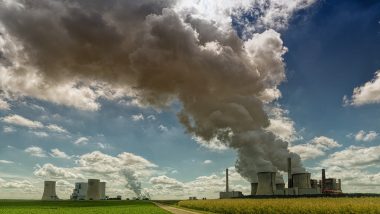Washington DC, September 15: Not only humans but plants and insects are also getting adversely affected by the high levels of pollution of major metropolitan cities of the planet, claims a study.The study -- published in the journal, 'Nature Communications' -- revealed that plants exposed to high levels of nitrogen dioxide (NO2) -- similar to levels recorded in major urban centres -- are able to better defend themselves against herbivorous insects.
Led by Dr Stuart Campbell from the University's Department of Animal and Plant Sciences, the research has discovered that plants exposed to increased levels of pollution produce more defensive chemicals in their leaves. Results from the study showed that insects feeding on these leaves grew poorly, which suggested high levels of air pollution may be having cascading negative effects on communities of herbivorous creatures. Over 1.2 Million Early Deaths in India Due to Air Pollution: Report.
Dr Campbell, who is also part of the P3 Centre -- a centre of excellence for translational plant science at the University of Sheffield, said, "Nitrogen dioxide is a pollutant that causes severe health problems in humans, but our research has found that it may also be having a significant impact on plants and insects."
Insects are a crucial part of nature and the world we live in. Insects are critical to the healthy functioning of ecosystems. Many people may be aware that insect pollinators such as the thousands of species of bees, along with flies, moths, and butterflies, are crucial for food production -- but they also ensure the long-term survival of wildflowers, shrubs, and trees.
"Insects that feed on plants (herbivorous insects) help return plant nutrients to the soil and are themselves food for wild birds, reptiles, mammals, and yet more insects. Insects are also immensely important for decomposing decaying organic matter and maintaining healthy soils," continued Dr Campbell.
Nitrogen dioxide is a major component of smog and is an example of pollution caused by human activity, particularly our reliance on fossil fuels. Levels of this pollutant in the atmosphere remain particularly high in cities, and especially in the UK. Plants that had been fed on by insects absorbed much less NO2, according to the study.
The authors believed this indicates that insects could be influencing the amount of pollution removed from the air by urban green spaces. Urban trees can absorb gaseous pollutants like NO2, but the effects appear to vary between species and locations, and this may be due in part to the actions of leaf-feeding insects.
However, Dr Campbell emphasised that the primary concern would be for the insects themselves. "Research suggests that urban vegetation plays a modest role in taking up NO2. More work is needed, because many factors may influence the effect of urban plants on air quality, including herbivory." "Plant feeding insects, however, face a number of different human threats, potentially including air pollution," added Dr Campbell.
(This is an unedited and auto-generated story from Syndicated News feed, LatestLY Staff may not have modified or edited the content body)













 Quickly
Quickly



















